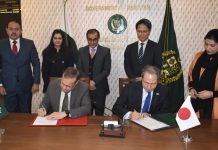By Adnan Rafique
ISLAMABAD: Chinese Company Pak Matiari-Lahore Transmission Company (PMLTC) has agitated on imposition of 17 percent GST on transmission service charges, official sources told Business Recorder.
CEO/President of the company, Zhang Li, in a letter to Managing Director PPIB stated that he is bringing it to the latter’s notice that amendments to the Finance Act, 2022 and Sales Tax Act, 1990, would have severe financial implications on Pak Matiari-Lahore Transmission Company (Private) Limited.
As per the amendment to the definition of “Goods” as provided under Section 2(12) of the Sales Tax Act, 1990, “goods” now include production, transmission and distribution of electricity. Moreover, clause (e) “production, transmission and distribution of electricity” has been inserted under definition of “supply” as provided under Section 2(33) of the Sales Tax Act, 1990.
“Since the aforesaid provisions have become effective from July 01, 2022, based on which PMLTC will be required to charge federal sales tax at 17 percent to NTDC on the monthly transmission service payment invoice,” said CEO of the company said
He further brought to the notice of PPIB the following financial implications: (i) PMLTC will now charge 17% sales tax to NTDC as part of the monthly transmission services payment invoice. Based on the same, and as per the provisions of the Sales Tax Act, 1990, PMLTC will be required to submit monthly Sales Tax Return on the principal of input/output basis. Since Input Tax is negligible (approximately 3%), PMLTC will be required to deposit such output sales tax charged to NTDC with the Federal Board of Revenue (FBR) on a monthly basis at the time of filing sales tax returns, irrespective of whether it has collected the same from NTDC or not; (ii) keeping in view that NTDC is currently settling the Transmission Services Payment with a delay of 4 to 5 months, it will create a huge financial burden on the Company particularly where more than 97% of such ‘output sales tax’ charged will not have a corresponding ‘input sales tax’ to offset against.
It is apprehended that the current overdue payment would further escalate as a result of imposition of General Sales Tax. Both NTDC and PPIB are already under “Purchaser Event of Default” pursuant to Section 16.20b) of TSA dated May 14, 2018 and “GoP Event of Default” pursuant to Section 14.16(i) of Implementation Agreement dated May 14, 2018, respectively; and (iii) 17 per cent will unnecessarily further burden the power sector by adding to the deficit and delay payments due to market players and shall increase cash flow constraints of public sector entities. This will also hamper the settlement of Transmission Service Payments on a timely basis, which is already engulfed with severe liquidity issues and circular debt.
The Company further contended that such provision in the Finance Act, 2022 and Sales Tax Act, 1990 may be amended by withdrawing the applicability of sales tax on Transmission Service Charge on the basis that Transmission Service Charge is equivalent to Capacity Purchase Price, as applicable in case of Independent Power Producers, and such Capacity Purchase Price invoiced by Independent Power Producers to Power Purchaser does not attract sales tax provisions. As per Section 2(46)(h) of the Sales Tax Act, 1990, as applicable on independent power producers and Wapda, energy purchase price only is included within the value of supply which typically comprises recovery against operation and maintenance expenses such as fuel procurement, operating costs and maintenance costs while capacity purchase price is specifically excluded from the definition of “value of supply”.
The relevant portion of the aforesaid provision is reproduced as follows: (46) “value of supply” means:-(h) in case of supply of electricity by an independent power producer or Wapda, the amount received on account of energy purchase price only; and the amount received on account of capacity purchase price, energy purchase price premium, excess bonus, supplemental charges etc. shall not be included in the value of supply.”
The CEO PMLTC has requested Managing Director PPIB to play his due role as a one-window facilitator and intervention in the matter is of abundant importance as the Company cannot sustain, especially in current liquidity crisis (and urged that discussions maybe entered into) with the FBR and other government institutions on the underlying matter, as the Company understands that FBR will create a liability and seek funds from it.






